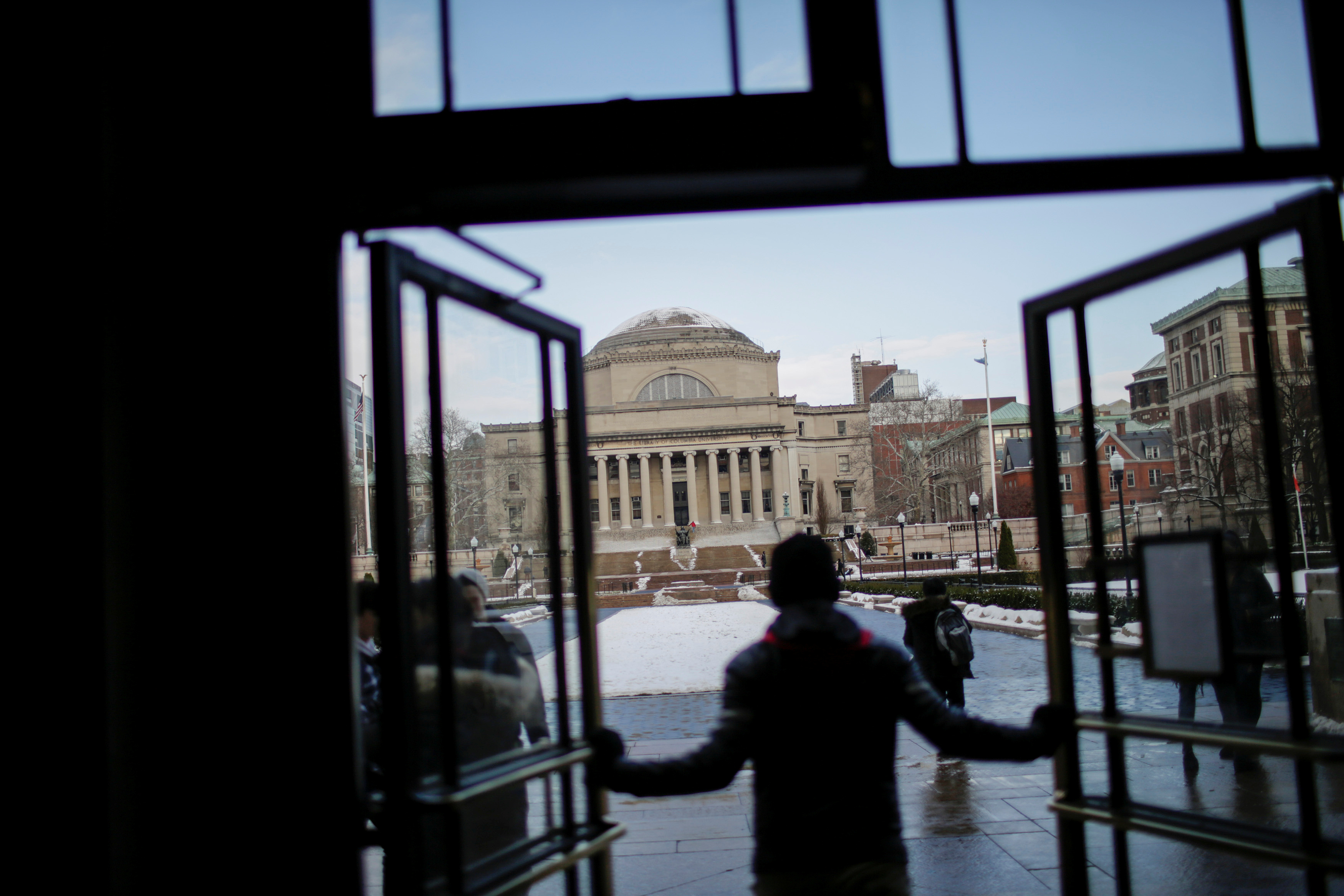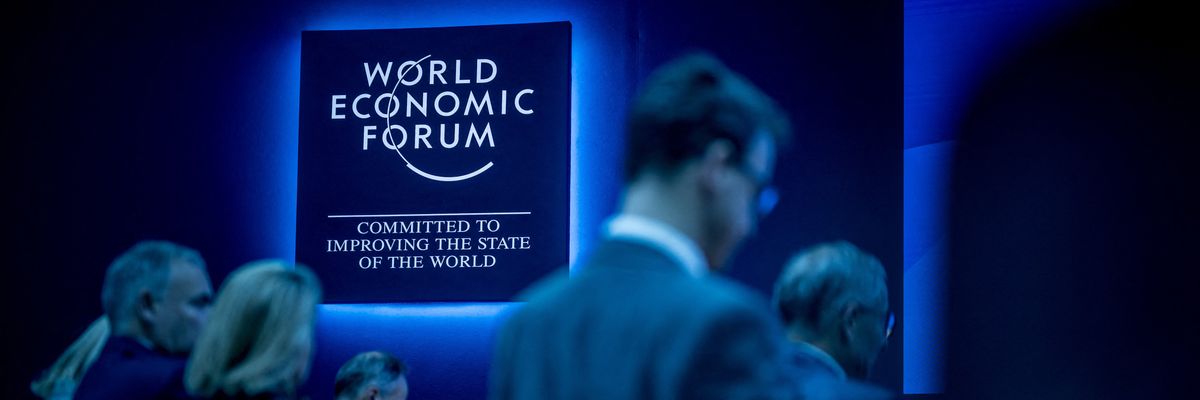Damascus (AFP) – Iran on Saturday accused Israel of a strike in Damascus that killed five Revolutionary Guards members, and vowed to avenge the latest attack on the Islamic republic's personnel abroad.
Issued on: 20/01/2024 - 20:13

People and security forces gather in front of a building destroyed in a reported Israeli strike in Damascus on January 20
© Louai Beshara / AFP
President Ebrahim Raisi said Tehran would not let the "cowardly assassination" go unanswered.
Israel has been accused of intensifying strikes targeting senior Iranian and allied figures in Syria and Lebanon -- backers of the Palestinian militant group Hamas -- raising fears that fighting in the Gaza Strip could spread further.
The Islamic Revolutionary Guard Corps (IRGC) confirmed it lost five members in the strike that it blamed on Israel, its regional arch-foe.
Hamas, which is backed by Tehran, also condemned what it called a "heinous crime".
In a statement, Raisi condemned "this cowardly attack".
"There is no doubt that continuing such terrorist and criminal acts ... will not remain without a response" from Iran, he said.
Earlier, Iran's foreign ministry spokesperson Nasser Kanani also blamed Israel and said Tehran "reserves the right to respond to organised terrorism" at the appropriate time and place.
Quoting an informed source, Iran's Mehr news agency said "the Revolutionary Guards' Syria intel chief" and his deputy were among those "martyred in the attack on Syria by Israel".
The Syrian Observatory for Human Rights war monitor said the Israeli strike on the Mazzeh neighbourhood of the capital killed 10 people.
Iranian media reported one of the dead was "General Sadegh Omidzadeh, responsible in Syria for intelligence for the Quds Force", the IRGC foreign operations arm.
There has been no official confirmation of his death.
The Guards' Sepah news agency named four of those killed as Hojatollah Omidvar, Ali Aghazadeh, Hossein Mohammadi and Saeed Karimi.
The mid-morning strike, which sent a large plume of smoke skywards, was also reported by Syrian state media.
Official news agency SANA said a residential building in Mazzeh had been targeted in what it called "an Israeli aggression".
The defence ministry said the strike killed "a number of civilians".
President Ebrahim Raisi said Tehran would not let the "cowardly assassination" go unanswered.
Israel has been accused of intensifying strikes targeting senior Iranian and allied figures in Syria and Lebanon -- backers of the Palestinian militant group Hamas -- raising fears that fighting in the Gaza Strip could spread further.
The Islamic Revolutionary Guard Corps (IRGC) confirmed it lost five members in the strike that it blamed on Israel, its regional arch-foe.
Hamas, which is backed by Tehran, also condemned what it called a "heinous crime".
In a statement, Raisi condemned "this cowardly attack".
"There is no doubt that continuing such terrorist and criminal acts ... will not remain without a response" from Iran, he said.
Earlier, Iran's foreign ministry spokesperson Nasser Kanani also blamed Israel and said Tehran "reserves the right to respond to organised terrorism" at the appropriate time and place.
Quoting an informed source, Iran's Mehr news agency said "the Revolutionary Guards' Syria intel chief" and his deputy were among those "martyred in the attack on Syria by Israel".
The Syrian Observatory for Human Rights war monitor said the Israeli strike on the Mazzeh neighbourhood of the capital killed 10 people.
Iranian media reported one of the dead was "General Sadegh Omidzadeh, responsible in Syria for intelligence for the Quds Force", the IRGC foreign operations arm.
There has been no official confirmation of his death.
The Guards' Sepah news agency named four of those killed as Hojatollah Omidvar, Ali Aghazadeh, Hossein Mohammadi and Saeed Karimi.
The mid-morning strike, which sent a large plume of smoke skywards, was also reported by Syrian state media.
Official news agency SANA said a residential building in Mazzeh had been targeted in what it called "an Israeli aggression".
The defence ministry said the strike killed "a number of civilians".
Hundreds of strikes
The building was cordoned off as rescuers searched the rubble for survivors.
"I heard the explosion clearly in the western Mazzeh area, and I saw a large cloud of smoke," one resident told AFP, requesting anonymity over security concerns.
"The sound was similar to a missile explosion."
Asked about the strike, the Israeli military told AFP: "We do not comment on reports from the foreign media."
During more than a decade of civil war in Syria, Israel has launched hundreds of air strikes, primarily targeting Iran-backed forces as well as Syrian army positions.
But such attacks have intensified since the war between Israel and Hamas, which like Lebanon's Hezbollah movement is an ally of Iran, began on October 7.

Syria © Sabrina BLANCHARD, Laurence SAUBADU, Sylvie HUSSON / AFP
The Observatory said the strike hit a four-storey building "where Iran-aligned leaders were meeting".
The Britain-based war monitor with a network of sources inside Syria said the targeted building belonged to the IRGC and that Mazzeh is known to be a high-security zone where leaders of the IRGC and pro-Iran Palestinian factions live.
The neighbourhood also houses the United Nations headquarters, embassies and restaurants.
"They were for sure targeting senior members" of Tehran-backed groups or Iranian forces, Observatory director Rami Abdel Rahman told AFP.
Exchanges of fire
Saturday's presumed Israeli strike was the second high-profile targeted assassination in Syria in less than a month.
In December, an air strike killed a senior Iranian general in Syria.
On January 2 in neighbouring Lebanon, where the powerful Iran-backed Hezbollah holds sway, Hamas deputy Saleh al-Aruri was killed in a strike widely blamed on Israel.
Days later, Israel killed top Hezbollah commander Wissam Tawil in a strike in south Lebanon.
Since the Israel-Hamas war began there have been regular cross-border exchanges of fire between Israel and Hezbollah in southern Lebanon.
Saturday's Damascus strike came four days after the IRGC said it attacked "an Israeli intelligence headquarters" in Arbil, capital of Iraq's northern autonomous province of Kurdistan.
Iraqi authorities said the attack killed four civilians and wounded six others.
Israel rarely comments on individual strikes targeting Syria, but has repeatedly said it will not allow Iran, which backs President Bashar al-Assad's government, to expand its presence there.
Since 2011, Syria has endured a bloody conflict that has claimed more than half a million lives and displaced several million people.
burs-srm/ami
© 2024 AFP
The Observatory said the strike hit a four-storey building "where Iran-aligned leaders were meeting".
The Britain-based war monitor with a network of sources inside Syria said the targeted building belonged to the IRGC and that Mazzeh is known to be a high-security zone where leaders of the IRGC and pro-Iran Palestinian factions live.
The neighbourhood also houses the United Nations headquarters, embassies and restaurants.
"They were for sure targeting senior members" of Tehran-backed groups or Iranian forces, Observatory director Rami Abdel Rahman told AFP.
Exchanges of fire
Saturday's presumed Israeli strike was the second high-profile targeted assassination in Syria in less than a month.
In December, an air strike killed a senior Iranian general in Syria.
On January 2 in neighbouring Lebanon, where the powerful Iran-backed Hezbollah holds sway, Hamas deputy Saleh al-Aruri was killed in a strike widely blamed on Israel.
Days later, Israel killed top Hezbollah commander Wissam Tawil in a strike in south Lebanon.
Since the Israel-Hamas war began there have been regular cross-border exchanges of fire between Israel and Hezbollah in southern Lebanon.
Saturday's Damascus strike came four days after the IRGC said it attacked "an Israeli intelligence headquarters" in Arbil, capital of Iraq's northern autonomous province of Kurdistan.
Iraqi authorities said the attack killed four civilians and wounded six others.
Israel rarely comments on individual strikes targeting Syria, but has repeatedly said it will not allow Iran, which backs President Bashar al-Assad's government, to expand its presence there.
Since 2011, Syria has endured a bloody conflict that has claimed more than half a million lives and displaced several million people.
burs-srm/ami
© 2024 AFP

















